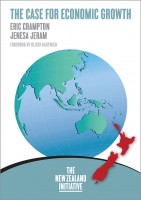Dr Eric Crampton on Newstalk ZB: Child flag vote
The idea of letting children as young as five vote on the flag referendum has been brought up in Parliament. Michael Gibson proposed the idea over a heated debate during public hearings. Read more

Eric Crampton is Chief Economist with the New Zealand Initiative.
He applies an economist’s lens to a broad range of policy areas, from devolution and housing policy to student loans and environmental policy. He served on Minister Twyford’s Urban Land Markets Research Group and on Minister Bishop’s Housing Economic Advisory Group.
Most recently, he has been looking at devolution to First Nations in Canada.
He is a regular columnist with Stuff and with Newsroom; his economic and policy commentary appears across most media outlets. He can also be found on Twitter at @ericcrampton.
Phone: +64 4 499 0790
The idea of letting children as young as five vote on the flag referendum has been brought up in Parliament. Michael Gibson proposed the idea over a heated debate during public hearings. Read more
If we took seriously the dozens of reports tallying the alleged costs of every social ill, the world would seem a pretty depressing place. I would be surprised if the sum of high-end costs reported in studies into alcohol abuse, obesity, incontinence and mental illness were much less than annual GDP. Read more
It’s easy to get reasonable people to agree that economic growth is a good thing, at least in principle. The New Zealand Initiative hosted a panel discussion on its recent report, by Jenesa Jeram and me, outlining the case for economic growth and dispelling a few myths around growth. Read more
Apart from longer life expectancy, better health, improved education, a cleaner environment, better opportunities for our children and a happier country, what has economic growth ever done for New Zealanders? Last night, MPs Chris Bishop, Dr David Clark and James Shaw debated the merits of economic growth, and of our recent report on it, at Mac’s Brew Bar in Wellington for an audience of about 150. Read more
The idea of a currency union with New Zealand is a perennial talking point, and with the kiwi dollar drawing close to parity with the Australian dollar it might seem like there’s never been a better time. However, as Sheryle Bagwell discovers, there’s not much appetite for an Anzac dollar across the Tasman. Read more
The #eFairnessNZ campaign says it wants to level the playing field between imported goods and those bought domestically by New Zealand consumers. Because it costs more to collect the tax on lower valued goods than the tax revenues are worth, GST is not charged on imported products valued at less than $400. Read more
Sometimes, it takes a Labour leader to point out the deadweight costs of taxation. And so there is a lot to like in Andrew Little’s economic policy statement. Read more
A few things puzzle me in the rights-holders' cease and desist letter to New Zealand ISPs offering "Global Mode" services. That's likely because I am not a lawyer. Read more
Should it be illegal to be a bit of a jerk? While all but the most tragic of politics aficionados watched the Black Caps grind through a cliffhanger semifinal win against South Africa rather than watching Parliament TV, the Harmful Digital Communications Bill passed its second reading. Read more
I have never been a fan of the old prayer wishing confusion upon one’s opponents. In a real war, your enemy’s confusion helps. Read more
You all know The New Zealand Initiative as a great little think tank for a great little country. You might not know that we are also a membership organisation: our work is supported by our members. Read more

Why should policy focus on economic growth? The Case for Economic Growth provides the New Zealand Initiative’s answer. Read more
I moved to New Zealand in 2003 because I saw it as an island (well, three islands and change) of sanity in a world going mad. The Outside of the Asylum, as Douglas Adams might put it. Read more
New Zealand is one of the world’s most expensive places to live. While there are a lot of reasons for that, a pretty substantial underlying reason is the country’s small population. Read more